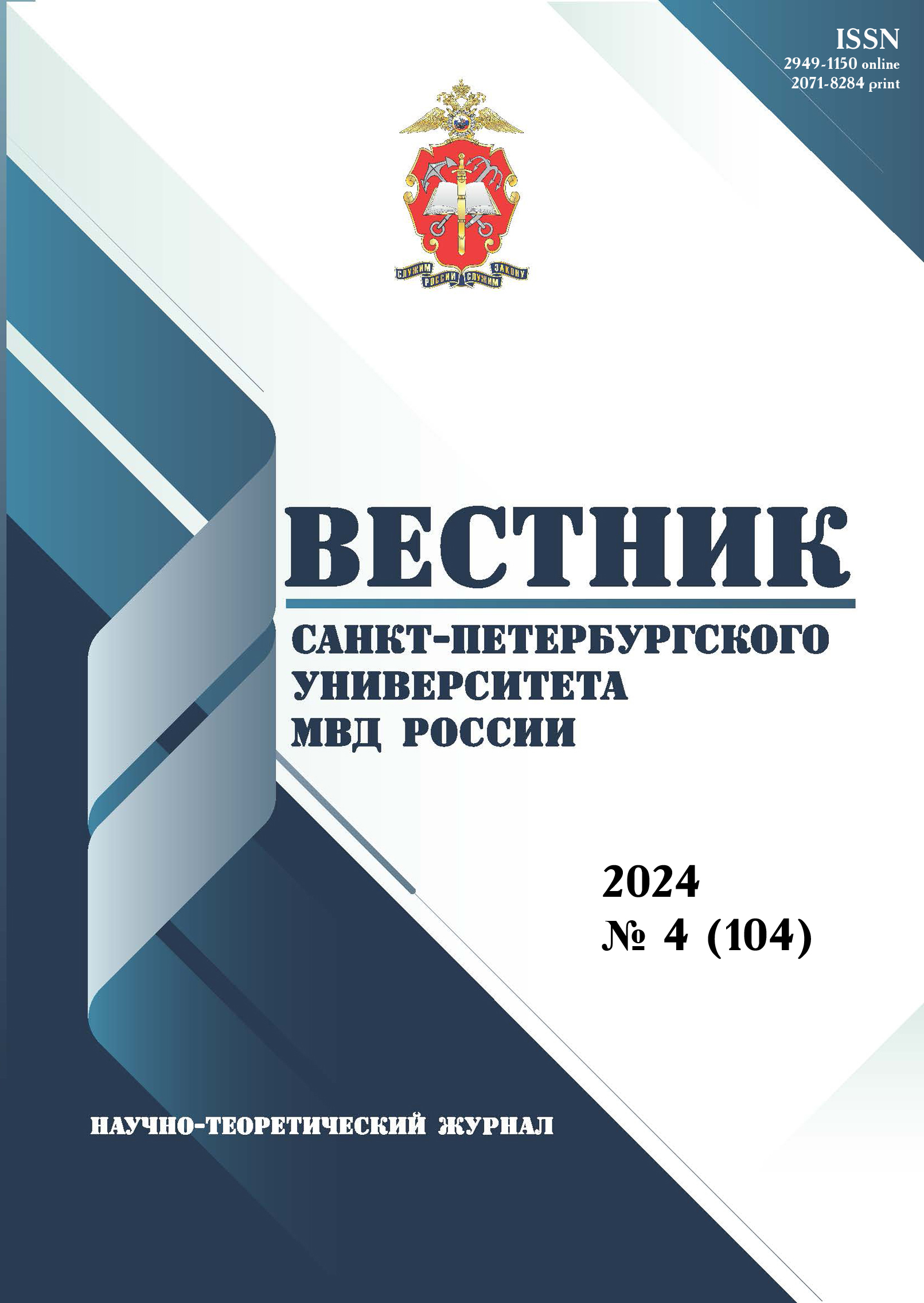from 01.01.2012 until now
N. G. Chernyshevsky Saratov State University (kafedra konstitucionnogo i municipal'nogo prava, docent)
from 01.01.2024 until now
Saratov, Saratov, Russian Federation
UDC 342.723
Introduction. The use of the Internet in committing offences against the sexual inviolability of minors is an emerging threat to their full mental and physical development. These crimes are characterised by a large number of victims suffering from a single person with a sexual behaviour disorder. The latent nature of such offences determines the scientific search for the practical ensuring of effective legal protection of minor's sexual inviolability on the Internet in line with the existing problems. Methods. General scientific methods of research (analysis, synthesis, comparison, generalisation) were used; private methods of research (system-structural, logical-legal) made it possible to comprehensively study the problem of sexual inviolability of minors and ways of its solution. The method of legal forecasting revealed the areas of legislative development on the problem to be solved. Results. The high social danger of indecent acts against minors online was revealed. This led to the development of specialised bodies for the protection of sexual inviolability of minors on the Internet in foreign countries, to the widespread introduction of artificial intelligence in the digital search for prohibited pornographic content. The author proposes to solve the problem under consideration in Russia by improving the legal regulation of supervision of persons convicted for violations of the sexual inviolability of minors through the “Safe City” system, as well as by restricting general access to the Internet for minors under the age of 14.
sexual inviolability, minors, crime prevention, child pornography, Internet, violence, protection
1. Tarabrina K. S. Mezhdunarodnye osnovy preduprezhdeniya nasil'stvennyh prestupleniy, sovershaemyh v otnoshenii nesovershennoletnih s ispol'zovaniem informacionno-cifrovyh tehnologiy // Pravo i gosudarstvo: teoriya i praktika. – 2023. – № 4 (220). – S. 327–329; https://doi.org/10.47643/1815-1337_2023_4_327.
2. Shunyaeva V. A. Zashita polovoy neprikosnovennosti nesovershennoletnih v seti Internet // Aktual'nye problemy gosudarstva i prava. – 2022. – T. 6, № 4. – S. 611–618; https://doi.org/10.20310/2587-9340-2022-6-4-611-618.
3. Kalashnik V. A. Polovye prestupleniya v otnoshenii nesovershennoletnih v seti internet: faktory dinamiki // Vestnik Moskovskogo gosudarstvennogo lingvisticheskogo universiteta. Obrazovanie i pedagogicheskie nauki. – 2022. – Vyp. 4 (845). – S. 106–111; https://doi.org/10.52070/2500-3488_2022_4_845_106.
4. Frolov A. A., Sil'nov D. S. Issledovanie mehanizmov rasprostraneniya zapreschennogo soderzhimogo v Darknet // Sovremennye informacionnye tehnologii i IT-obrazovanie. – 2017. – T. 13, № 4. – S. 216–224; https://doi.org/10.25559/SITITO.2017.4.444.
5. Nagornaya I. I. Ugolovnaya otvetstvennost' za prestupleniya protiv detey v SShA // Vestnik Rossiyskogo universiteta druzhby narodov. Seriya: Yuridicheskie nauki. – 2023. – T. 27, № 4. – S. 1007–1027; https://doi.org/10.22363/2313-2337-2023-27-4-1007-1027.
6. Kolbasin V. V. Vliyanie informacionno-telekommunikacionnyh tehnologiy na dinamiku nasil'stvennyh deystviy seksual'noy prestupnosti v otnoshenii maloletnih i nesovershennoletnih // Obschestvo i pravo. – 2022. – № 2 (80). – S. 39–47.
7. Krymov D. V. IP-adresa i MAC-adresa kak element gosudarstvennogo kontrolya // Buhgalterskiy uchet. – 2021. – № 3. – S. 83–88.
8. Golovanova N. A. Novye formy onlayn-prestupnosti za rubezhom // Zhurnal zarubezhnogo zakonodatel'stva i sravnitel'nogo pravovedeniya. – 2019. – № 3 – S. 42–57; https://doi.org/10.12737/jflcl.2019.3.4.
9. Quayle E. Prevention, disruption and deterrence of online child sexual exploitation and abuse // ERA Forum. – 2020. – Vol. 21. – R. 429–447; https://doi.org/10.1007/s12027-020-00625-7.
10. Baymahanova U. M. Prichiny vozniknoveniya stressovyh situacii na fone razvitiya cifrovyh i kommunikacionnyh tehnologiy / Zhuravlevskie chteniya. Transformacionnye processy v pedagogicheskoy nauke i obrazovanii : materialy VI Mezhdunarodnoy nauchno-prakticheskoy konferencii, posvyaschennoy pamyati Zhuravleva Vasiliya Ivanovicha, Moskva, 11–16 fevralya 2022 g. / otv. red. N. A. Gorlova. – Moskva: Moskovskiy gosudarstvennyy oblastnoy universitet, 2022. – S. 81–90.
11. Komkova G. N., Tyumeneva N. V., Toguzaeva N. V. Yuridizaciya internet-prostranstva kak sposob povysheniya informacionno-kommunikativnoy kul'tury grazhdan // Yuridicheskiy vestnik Dagestanskogo gosudarstvennogo universiteta. – 2020. – T. 34, № 2. – S. 151–155; https://doi.org/10.21779/2224-0241-2020-34-2-151-155.
12. Kulakova T. A., Volkova A. V. Cifrovoy suverenitet i politiko-administrativnye rezhimy // Vestnik Sankt-Peterburgskogo universiteta. Filosofiya i konfliktologiya. – 2023. – T. 39, vyp. 1. – S. 92–105; https://doi.org/10.21638/spbu17.2023.108.
13. Pol'shikov A. V. Osnovnye napravleniya povysheniya effektivnosti mer bor'by s prestupleniyami, sovershaemymi protiv nesovershennoletnih na seksual'noy pochve // Obschestvennaya bezopasnost', zakonnost' i pravoporyadok v III tysyacheletii. – 2020. – № 6–1. – S. 103–108.
14. Erezhipaliev D. I. Sovershenstvovanie zakonodatel'stva ob administrativnom nadzore za licami, sudimymi za prestupleniya seksual'nogo haraktera v otnoshenii nesovershennoletnih // Vestnik Universiteta prokuratury Rossiyskoy Federacii. – 2022. – № 1 (87). – S. 72-82.
15. Shumskiy V. V., Tkachenko V. V., Kolenichenko V. V. Vospitanie nesovershennoletnih v sovremennoy srede kak faktor profilaktiki pravonarusheniy // Pravo i upravlenie. – 2023. – № 7. – S. 249–255.
















